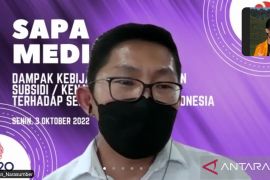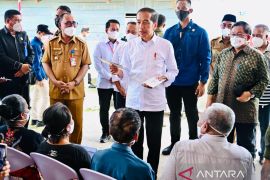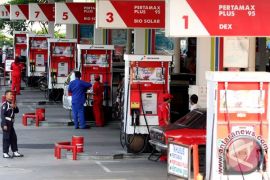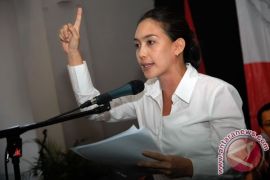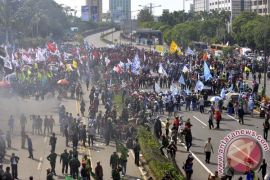The demonstrators were rushed to the hospitals after sustaining injuries during rallies held in protest against the government`s plan to raise fuel oil prices.
The government is planning to raise the price of subsidized fuel oil on April 1 and has submitted two options to the House of Representatives (DPR).
In the first proposal, the government seeks to raise the price of subsidized premium gasoline from Rp4,500 to Rp6,000 per liter, and diesel oil from Rp4,500 to Rp6,000 per liter.
A standby health post in the National Monument (Monas) Square in Jakarta recorded that eight demonstrators were taken to the Tarakan hospital, 12 rushed to Cipto Mangungkusumo (RSCM) hospital and 15 others admitted to the Army Gatot Subroto (RSPAD) hospital.
The demonstrators, who were students grouped under the Indonesian Student National Committee, held the rallies to protest against the government`s plan to increase subsidized fuel oil prices.
The rally held by hundreds of students at the eastern gate of Monas turned chaotic, prompting the police to open tear gas and water canon fires.
The riot began when a student hurled a stone to security officers, forcing the police to open tear gas fires to disperse the demonstrators.
Student demonstrators were successfully sent away by the police to the Gambir railway station, where they stopped their protests.
Police arrested 35 demonstrators and took them to the Jakarta Regional Police Headquarters after they clashed with security officers during a rally on Tuesday, in protest of the government`s plan to raise fuel oil prices.
"They still have to undergo further questioning," Jakarta Police Spokesman Senior Commissioner Rikwanto said here on Tuesday.
Rikwanto explained that the police would examine and record the identities of the demonstrators who had been taken into custody to see how far they were involved in the clashes.
In the meantime, hundreds of people from Traditional Market Workers Association (IKKP), Jakarta`s Transportation Front, Jakarta State University and the Indonesian Democratic Party of Struggle (PDIP) left the state palace after spending an hour stating their opinions there.
Apart from that, Indonesia`s Deputy Energy Minister Widjajono Partowidagdo said Indonesia could no longer apply a cheap oil fuel policy because it has become a net oil importer while its reserves are also less.
"As a net oil importer and because its proven oil reserves are also less it is no longer wise for the country to follow the cheap oil policy of countries with abundant reserves," he said here on Tuesday.
He said the cheap oil policy so far had absorbed the government funds into oil subsidy, sustained dependency on oil fuels and also increased imports of crude oil, making it difficult to develop other energy sources.
The government and the House of Representatives are scheduled to hold a meeting later this week to decide whether the price of subsidized gasoline will be raised as of April 1.
Meanwhile, demonstrations and rallies continue to take place in several parts of the country such as in Makassar (South Sulawesi), Medan (North Sumatra), Aceh and Papua in protest of the government`s plan to raise the fuel oil prices.
Widjajono said in 2011 Indonesia produced 329 million barrels of oil, exported 132 million barrels, imported 99 million barrels of crude and 182 million barrels of fuel oils while consuming 479 million barrels of fuel oils.
"In total, Indonesia suffered a deficit of 150 million barrels," he said.
Meanwhile, the deputy minister said that Indonesia`s proven oil reserves have been recorded at only 3.7 billion barrels or 0.3 percent of the world`s proven reserves.
"Indonesia is not an oil-rich country. We have other abundant energy sources such as coal, natural gas, coal bed methane, natural gas shale, geothermal energy, hydro-energy and vegetable oil energy sources," he noted.
He said the cheap energy policy only fits countries endowed with abundant oil reserves such as Saudi Arabia, Iraq, Libya and Venezuela.
Widjajono said even in Iran, whose oil reserves reach 138 billion barrels, the price of gasoline reaches US$0.67 per liter or higher than that of Indonesia, which is only US$ 0.59 per liter while the country`s reserves are recorded at only 3.7 billion barrels.
"The price of gasoline in Iran is expensive because they prioritize gas for use in transportation, household and electricity," he said.
Iran has the second largest gas reserves in the world, 982 trillion cubic feet, after Russia while Indonesia only has 112 TCF, he added.
Widjajono said Latin American countries such as Brazil, Argentina and Chile do not subsidize their gasoline prices and therefore, their national industries such as cars, aircraft, weapons and agriculture have developed.
"India, Pakistan, China and Vietnam also do not subsidize their gasoline prices but in general, they subsidize their public transportation services and their national industries are advancing quickly," he noted.
Widjajono also noted that China uses natural gas and electricity for its public transport services, while its motorbikes are powered by electricity. (*)
Reporter: Bustanuddin
Editor: Kunto Wibisono
Copyright © ANTARA 2012
